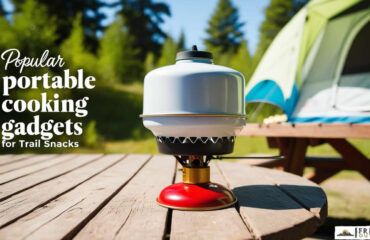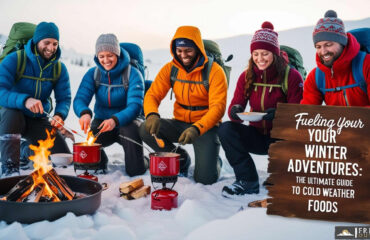
Discover essential nutritional supplements that enhance performance, recovery, and overall health for outdoor enthusiasts.
The Importance of Nutrition for Outdoor Enthusiasts
Proper nutrition is crucial for outdoor enthusiasts, as it directly influences energy levels, stamina, and overall performance during activities like hiking, camping, and climbing. Engaging in physically demanding outdoor activities requires a balanced diet that supports endurance and helps in quicker recovery. Nutritional supplements play a vital role in this context by filling the gaps where a balanced diet may fall short. They are designed to enhance performance, maintain energy levels, and facilitate recovery after strenuous activities, making them essential companions for outdoor adventurers.
When outdoor enthusiasts face nutritional deficiencies, they may experience fatigue, decreased performance, and an increased risk of injuries. For instance, a hiker who neglects to replenish essential nutrients may find themselves unable to keep pace with their group or recover adequately between hikes, leading to a less enjoyable experience. Moreover, the rigorous nature of outdoor activities often demands more nutrients than the average diet provides, which underscores the importance of nutritional supplements. Therefore, understanding and incorporating these supplements can significantly contribute to a successful outdoor adventure.
Additionally, the environment itself can impose additional nutritional challenges. Exposure to elements, fluctuations in temperature, and increased physical exertion can deplete the body’s reserves more rapidly than during sedentary activities. As such, outdoor enthusiasts should not only prioritize nutrition but also adapt their dietary strategies to meet the unique demands of their adventures. Nutritional supplements can provide the necessary support to help individuals thrive in challenging conditions, ensuring they are well-prepared for the rigors of outdoor exploration.
The Role of Protein Powders
Protein powders are an excellent addition to the diets of outdoor enthusiasts, particularly for those involved in activities requiring significant muscle endurance and recovery. These powders aid in muscle repair, enhance endurance, and provide a convenient source of protein when preparing meals outdoors. Common sources of protein powders include whey, casein, and plant-based options such as pea or hemp protein, catering to various dietary preferences and requirements.
To reap the benefits of protein, it’s recommended to consume 20-30 grams within 30 minutes post-activity, as this timing maximizes muscle recovery and growth. This is particularly important after a long hike or climb, where muscle fibers may be stressed and in need of repair. Additionally, protein powders can be easily incorporated into smoothies or oatmeal, making them a versatile option for on-the-go nutrition during outdoor activities. For example, a long-distance hiker can mix protein powder into their morning oatmeal to ensure they start their day with ample nutrients for the challenges ahead.
When hiking, the body requires sustained energy, and the inclusion of protein can help curb hunger, reducing the temptation to snack on less nutritious options. For outdoor enthusiasts, a good protein powder can become a staple in their dietary regimen, offering both convenience and nutritional benefits.
In addition, it is essential for outdoor enthusiasts to choose high-quality protein powders that fit their specific dietary needs. Some may prefer vegan options, while others may require protein that is free from allergens. This consideration can enhance the overall experience by ensuring that the supplements consumed align with personal health goals and preferences, ultimately supporting optimal performance during outdoor adventures.
Benefits of Energy Gels
Each gel typically contains 20-25 grams of carbohydrates, which are quickly absorbed by the body to help sustain energy levels. Many outdoor enthusiasts rely on energy gels as a convenient source of fuel that can be consumed without water, making them ideal for on-the-go situations.
Some energy gels even contain added caffeine, which can enhance performance and alertness during strenuous activities. For instance, a climber facing a challenging ascent might consume an energy gel to maintain their energy levels and focus. It’s essential for individuals to test different brands and flavors during training to find the options that work best for their bodies, ensuring they can rely on these gels when they are most needed.
Furthermore, the convenience of energy gels makes them a favorite among athletes and adventurers alike. They are lightweight, portable, and require no preparation, making them a practical choice for those who are always on the move. The ease of carrying several packets ensures that outdoor enthusiasts can fuel their bodies without the bulk of traditional snacks, which might be heavier and take up more space in a backpack. For example, marathon runners often carry energy gels to replenish their energy reserves, allowing them to maintain peak performance throughout their events.
It’s also crucial for outdoor enthusiasts to be mindful of their body’s response to energy gels. Some individuals may experience gastrointestinal discomfort if they consume gels that are too high in sugar or contain artificial ingredients. Therefore, carefully selecting gels that are naturally formulated and testing their effects during training can be beneficial. This approach not only optimizes performance but also ensures a more enjoyable outdoor experience.
Importance of Electrolyte Tablets
Electrolyte tablets are vital for hikers and outdoor enthusiasts, as they help replenish essential minerals lost through sweat, which is crucial for maintaining hydration and stamina. Key electrolytes such as sodium, potassium, and magnesium are critical during extended outdoor activities, as imbalances can lead to muscle cramps and fatigue. By dissolving one tablet in 16-20 ounces of water during vigorous activities, hikers can effectively support their hydration needs.
Some electrolyte tablets also provide added vitamins, giving a comprehensive solution for hydration and nutrition, which can be especially beneficial during extended outdoor excursions.
In addition to aiding hydration, electrolyte tablets can enhance recovery post-activity. After a long day of hiking or climbing, the body may be depleted of vital minerals due to excessive sweating. Consuming electrolyte tablets after strenuous activities can help restore these lost nutrients, promoting quicker recovery and reducing muscle soreness. This is particularly important for outdoor enthusiasts who engage in multiple days of activities, as it allows them to recover adequately and prepare for the next day’s challenges.
Furthermore, staying hydrated with electrolyte tablets can help improve mental focus and performance during outdoor activities. Dehydration can lead to diminished cognitive function, which is crucial when navigating unfamiliar terrains or engaging in complex outdoor skills. By maintaining proper hydration levels through the use of electrolyte tablets, outdoor enthusiasts can enhance their decision-making abilities and overall experience while on their adventures.
Joint Support Formulas
Joint support supplements can be particularly beneficial for outdoor enthusiasts who engage in rigorous activities that put stress on their joints. Formulas containing glucosamine and chondroitin are known to help reduce discomfort during hikes and improve flexibility, which is essential for preventing injuries. These supplements promote overall joint health, allowing outdoor adventurers to maintain their mobility and enjoyment during strenuous activities.
In addition to glucosamine and chondroitin, other ingredients like turmeric and omega-3 fatty acids are recognized for their anti-inflammatory properties, further supporting joint health. For instance, a hiker who regularly uses joint support formulas may notice a significant reduction in pain and discomfort, enabling them to tackle more challenging trails without hesitation.
Regular use of joint support supplements can also provide long-term benefits for outdoor enthusiasts. As individuals age or engage in high-impact activities, the wear and tear on joints can lead to chronic pain and decreased mobility. By incorporating joint support formulas into their daily routine, outdoor enthusiasts can take proactive measures to protect their joints, ensuring they remain active and capable of enjoying their favorite outdoor pursuits for years to come.
Moreover, it’s important for outdoor enthusiasts to consult with healthcare professionals before starting any joint support regimen. This can help tailor the supplements to individual needs and ensure that they are taking appropriate dosages. Understanding the specific requirements for joint health can further enhance performance and enjoyment during outdoor activities, allowing individuals to explore without the worry of joint discomfort.
Multivitamins for Overall Health
Multivitamins serve as a foundation for overall health, particularly for outdoor enthusiasts exposed to various environmental factors. A well-rounded multivitamin can help fill nutrient gaps in the diet, ensuring that individuals receive essential vitamins and minerals necessary for energy metabolism and immune support. Key vitamins to consider include Vitamin C for immune function and B vitamins for energy production.
For example, a camper taking a comprehensive multivitamin may find that it helps bolster their immune system, allowing them to enjoy their outdoor experience without falling ill. Additionally, minerals like zinc and iron play crucial roles in maintaining energy levels, which is vital for active individuals participating in strenuous outdoor activities.
Moreover, timing of multivitamin consumption can significantly affect absorption and efficacy. Many experts recommend taking multivitamins with food to enhance nutrient uptake and reduce the risk of gastrointestinal discomfort. This practice is particularly relevant for outdoor enthusiasts who may be consuming a wide variety of food during their adventures, ensuring they are maximizing the benefits of their chosen supplements.
It is also worth noting that outdoor enthusiasts should select multivitamins tailored to their specific lifestyle needs. For instance, those who engage in high levels of physical activity may require higher doses of certain vitamins and minerals to support their energy levels and recovery. By choosing the right multivitamin, individuals can better align their nutritional strategies with their outdoor pursuits, enhancing both performance and overall health.
The Role of Probiotics
Probiotics can significantly enhance gut health, which is particularly important for outdoor enthusiasts who may experience digestive challenges during long camping trips. These beneficial bacteria, found in supplements and fermented foods, support digestion and nutrient absorption, improving overall health and physical performance. Common probiotic strains such as Lactobacillus and Bifidobacterium are known to be effective for outdoor adventurers.
For instance, a hiker who regularly incorporates probiotics into their diet may notice improved digestion and reduced gastrointestinal discomfort on the trail. This is particularly relevant when consuming a diet high in carbohydrates or processed foods, which can disrupt gut health. To maximize the benefits, probiotics should be consumed consistently, as their effects are cumulative and contribute to a healthy gut microbiome.
In addition to supporting digestion, probiotics can play a role in boosting the immune system—a crucial factor for outdoor enthusiasts who may be exposed to various pathogens while camping or hiking. A robust gut microbiome is linked to a stronger immune response, which can help prevent illness during outdoor excursions. For example, a camper with a healthy gut may be less likely to experience digestive issues that could hinder their enjoyment of the trip.
Furthermore, outdoor enthusiasts should consider the form in which they consume probiotics. While supplements are convenient, incorporating fermented foods such as yogurt, kefir, or sauerkraut into meals can provide a natural source of these beneficial bacteria. This approach not only enhances gut health but also adds variety and flavor to outdoor meals, contributing to a more enjoyable dining experience while camping or hiking.
Energy Bars as Nutritional Snacks
Energy bars are a popular choice among outdoor enthusiasts due to their convenient, portable nature and balanced mix of carbohydrates, proteins, and fats. Typically, these bars contain ingredients like oats, nuts, and dried fruits, providing both nutrition and taste. When selecting energy bars, it’s essential to choose those that offer at least 200 calories and are low in added sugars for sustained energy.
For example, a hiker might pack energy bars made from whole food ingredients to ensure they have nutritious snacks available during their trek. These bars can serve as meal replacements when fresh food isn’t accessible, facilitating easier meal planning and nutrition management during outdoor adventures.
Moreover, energy bars can be an excellent source of quick energy when time is of the essence. During challenging hikes, stopping to prepare a meal may not be feasible, making energy bars a practical solution to keep energy levels up. They can be easily consumed during breaks, providing the necessary fuel to tackle the next leg of the journey without lengthy delays.
Another important consideration when choosing energy bars is the inclusion of functional ingredients that can enhance performance. Some bars are fortified with additional nutrients such as vitamins, minerals, or even adaptogens, which can help the body cope with stress during physical exertion. For instance, a bar that includes magnesium can aid in muscle function and recovery, making it a smart choice for outdoor enthusiasts looking to optimize their nutrition while on the go.
The Importance of Meal Planning
Effective meal planning is essential for outdoor activities, as it involves calculating caloric needs based on the duration and intensity of the planned activities. Focusing on balanced meals that include a mix of macronutrients—carbohydrates, proteins, and fats—along with a variety of fruits and vegetables can fuel outdoor adventures more effectively. Lightweight, compact, and non-perishable food options are recommended for easy packing.
For instance, preparing meals ahead of time can help reduce stress and ensure nutritious options are readily available during trips. This preparation is particularly beneficial when venturing into remote areas where food resources may be limited. Including high-protein and healthy fat snacks can also help maintain energy levels throughout the day, ensuring that outdoor enthusiasts can enjoy their activities without feeling fatigued or deprived of nutrition.
Moreover, meal planning should take into account the specific energy requirements for different activities. A day of hiking may require more carbohydrates for energy, while a day of rock climbing may necessitate higher protein intake for muscle repair. By tailoring meals to the demands of each activity, outdoor enthusiasts can optimize their performance and recovery, ensuring they are well-fueled for whatever challenges lie ahead.
Additionally, it’s essential to remain flexible with meal plans while on the trail. Weather changes or unforeseen circumstances can affect food availability and preparation options. Outdoor enthusiasts should be prepared to adapt their meal plans as necessary, ensuring they still meet their nutritional needs even in challenging conditions. This adaptability can help maintain energy levels and overall well-being during outdoor adventures.
Adapting Supplements to Personal Needs
Choosing the right nutritional supplements involves considering personal health needs, planned activities, and dietary restrictions. Consulting with healthcare professionals can provide guidance on effective supplement choices that align with individual goals for outdoor adventures. Personal preferences and experiences should significantly influence the selection of specific products to optimize performance and recovery.
For example, an outdoor enthusiast might keep a log of their supplement effects to evaluate what works best for their energy and recovery needs. This reflective practice can lead to a more informed approach to supplement selection, ensuring that individuals are not only meeting their nutritional requirements but also enhancing their overall outdoor experiences. Experimenting with different combinations of supplements during training can help identify the most beneficial regimen tailored to individual requirements.
Additionally, it’s important for outdoor enthusiasts to be aware of the quality and sourcing of the supplements they choose. With a growing market for nutritional supplements, not all products are created equal. Seeking out reputable brands that prioritize transparency and quality can ensure that individuals are consuming safe and effective supplements that genuinely support their outdoor activities.
Furthermore, as outdoor enthusiasts progress in their fitness journeys, their supplement needs may change. Regularly reassessing nutritional requirements based on evolving activity levels, physical demands, and personal health can ensure that individuals remain adequately supported throughout their outdoor adventures. By taking a proactive approach to nutrition and supplement use, outdoor enthusiasts can enhance their performance, recovery, and overall enjoyment of their time spent in nature.




